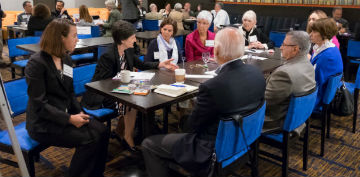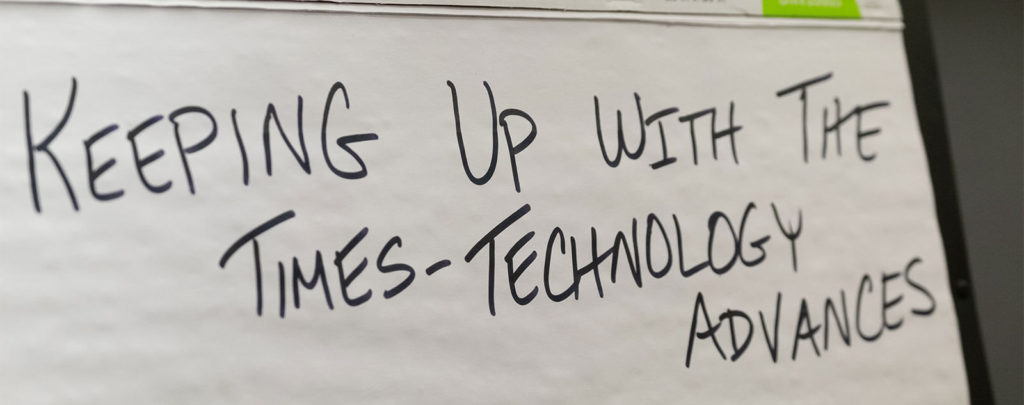
Members of the PCSS Steering Committee met last week in Washington, D.C., energized and motivated to strategize and brainstorm for the coming year. The overall goal of the meeting was to share what PCSS has accomplished in the past year, discuss proposed activities, and create a strategic plan for the future. The objective was to build on and enhance the existing work throughout the country by health professionals on preventing, identifying, and treating substance use disorders (SUDs) with a primary focus on opioid use disorders (OUD) and define how to fill any gaps.
The Steering Committee is made up of a diverse coalition representing over one million health professionals with representatives from primary care, addiction, recovery and other key stakeholders, all with a vested interest in addressing the nation’s opioid overdose epidemic. The group supported PCSS plans to broaden its scope to include alcohol, tobacco, and other topics related to substance use disorders, as well as expand resources on mental disorders and suicidality. The group also discussed the transition from two projects—PCSS-O and PCSS-MAT—into a single project that encompasses all areas relating to SUD and OUD. Marketing and outreach were defined as major priorities to ensure that clinicians are aware of the free resources available from PCSS and avoid duplication of efforts and wasted resources
The two-day meeting kicked off with PI and Project Director Kathryn Cates-Wessel giving an update and overview of the PCSS projects and applauding the collaborative and creative nature of this coalition. She stated that the success of this endeavor is because of the many contributions and support of each of the Steering Committee organizations.
Highlights of the past year include:
- Releasing the nurse practitioner and physician assistant medication assisted treatment waiver course
- Launching the chronic pain core curriculum
- Expanding the PCSS discussion forum where primary care providers have access to an “expert of the month”
- Developing a series of videos that address stigma and SUD within the medical profession and general community
- Releasing a series of naltrexone resources
- Collaboration with Medscape on its Consult section, where PCSS clinical experts respond to questions
- Developing podcasts
- Launching a five-state implementation pilot program to address barriers to expansion of evidence-based practices around SUD with a focus on OUD
 After meeting as a whole, the members broke up into smaller groups, facilitated by Laura Gordon, a communications expert from the public relations firm, Edelman. The firm was recently hired to work with PCSS to create an outreach strategy with a toolkit of promotional materials. The small groups were charged with how to gain insight and recommendations in three primary areas—1) Are we talking about the programs in the most compelling way? 2) How can we be more effective at the state level? And 3) How can we better integrate behavioral health resources into our efforts?
After meeting as a whole, the members broke up into smaller groups, facilitated by Laura Gordon, a communications expert from the public relations firm, Edelman. The firm was recently hired to work with PCSS to create an outreach strategy with a toolkit of promotional materials. The small groups were charged with how to gain insight and recommendations in three primary areas—1) Are we talking about the programs in the most compelling way? 2) How can we be more effective at the state level? And 3) How can we better integrate behavioral health resources into our efforts?
Each group discussed the lessons learned in the past year, detailed any stumbling blocks encountered, and what they hope to achieve in the coming year.
An overarching theme for this meeting was BE CREATIVE, share your expertise and experience, and together we can make a difference. The small group discussion exercise was jumpstarted with a recent video AAAP created working with Columbia University on the importance of having medical professionals understand the role that stigma plays in treating patients with substance use disorders but also how rewarding and gratifying this work can be as well. Members were broken up into small groups and given bubble, tiaras, fidget spinners and kaleidoscopes to help jumpstart their creative juices and add a bit of levity to a day spent discussing a serious and sobering set of challenges.
PCSS has made huge strides in this ever-intensifying public health crisis but with the support and contributions of this large coalition working side by side, together we can make a difference.

